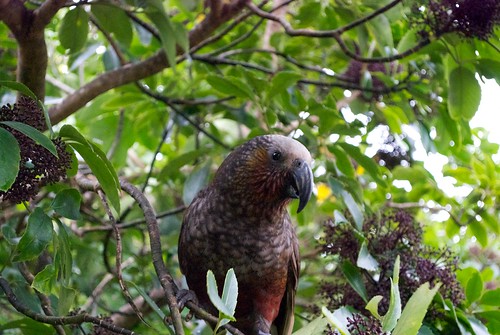Botanic garden kaka in return to her birthplace
 Wednesday, July 10, 2013 at 15:06
Wednesday, July 10, 2013 at 15:06  Kaka in the tree. Image by Rich Childs.A kaka bred at the Dunedin Botanic Garden has made her way home, and appears to be taking up residence.
Kaka in the tree. Image by Rich Childs.A kaka bred at the Dunedin Botanic Garden has made her way home, and appears to be taking up residence.
Although a final identification had not been made, she was believed to have been relocated to the Orokonui Ecosanctuary aviary last May, and released to the wider environs of the ecosanctuary in August. Aviary supervisor Tim Cotter said the 20-month-old kaka was the first to return in the eight or nine years the garden has bred the parrots.
She had visited her parents in the aviary, and at one stage appeared to try to find a way in.
Despite being at risk from predators, she would not be captured or let in to the aviary, as the breeding programme's purpose was to re-establish the birds in the wild.
''We'll just monitor her, and see if she is hanging around because she's hungry ... Otherwise we'll just leave her to her own devices, really, because she's wild, and it was expected the birds would fly out of Orokonui.''
She was looking ''fine and settled'' at present, and had started to strip trees.
''I've already had one gardener go: `That's one of my favourite trees that she's stripping bark off there'.''
If she found a mate, she would be vulnerable to predators while sitting on a nest.
''In the city, she'll just be a target for cats, ferrets, stoats, rats and even possums.''
She was first spotted on Tuesday, about 5pm, by two ''observant'' members of the public, Mr Cotter said.
Orokonui Ecosanctuary conservation manager Elton Smith said it was possible she had left to find a mate. Unusually, the ecosanctuary's kaka population comprised more females than males.

